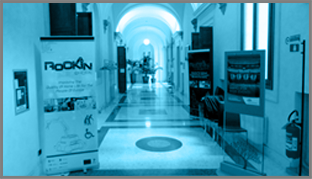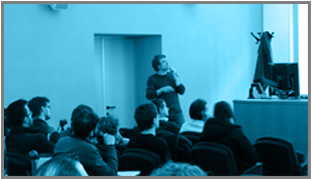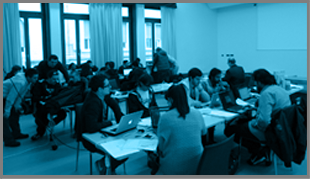RoCkIN
Camp 2014
Rome, Italy
26 - 30 Jan 2014
The morning lectures were held at the nearby Sapienza University and featured guest lecturers Michael Zillich, Norman Hendrich and Matthew Walter. Topics covered included vision based pattern recognition, object and people detection, object grasping and manipulation, and Human-Robot Interaction in natural language.
In the afternoon, the programming and hardware tinkering began in the power-cord-and-Ethernet-cable jungles of the Challenge areas. Participants ranged from undergraduates to PhD students and companies, and for many of the former this was their first opportunity to work with such advanced robots.
Support was on hand from members of the RoCKIn team throughout the week and teams were encouraged to share tips and tricks. This supportive and collaborative environment allowed teams to save months of trial and error in developing their robots and own expertise.
On the final day, teams had the opportunity to demo what they had been working on over the week in the custom-built RoCKIn@Home and RoCKIn@Work arenas. This included things like getting the robots to take instructions, autonomously navigate the arenas, and grip and transport objects. Awards were given for the best overall demos and best performances in the functionality demos, which objectively assessed Perception, Manipulation and Human-Robot Interaction through speech. The full agenda can be found here.
The Camp was designed to prepare teams for RoCKIn2014, our competition event happening in Toulouse, France in November later this year. Sign up to our mailing list above or follow us on Twitter to be the first to hear about all the latest RoCKIn developments.
The Camp was partially supported by the IEEE RAS-TEP program ( IEEE Robotics & Automation Society Technical Education Program - Summer Schools).







